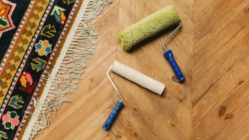
Many homebuyers are interested in the possibility of purchasing a fixer-upper property. Fixer-uppers typically have competitively low sale prices that require renovations and repairs that can quickly add up. Below are seven options and considerations for any homebuyer thinking about buying a fixer-upper.
FHA Financing Is Viable
Several years ago, we helped a wealthy investment banker purchase a dilapidated fixer-upper for about $600,000.
Two things made the transaction interesting: (1) the buyer used FHA financing with 3.5% down even though he could have qualified for any financing he wanted and for at least ten times the amount; and (2) the selling agent did a masterful job of prepping the house for the appraiser.
The buyer put the minimal amount down because he planned to immediately gut and rebuild the entire property, and he simply wanted to preserve cash.
The selling agent had the listing agent remove any comments from the MLS that might trigger extra scrutiny (or a call for inspection reports and work to be done) by either the appraiser or the underwriter. And, she also had some “cosmetic improvements” done prior to the appraiser’s visit to make sure he didn’t see anything that might arouse additional concerns.
The buyer did not use renovation financing because he had enough cash to do the improvements himself, and because there were multiple offers and the seller insisted on a fast close.
I tell the above story because it illuminates the simplest and cleanest way to purchase a fixer-upper – the topic of today’s blog.
Options/Considerations For Financing A Fixer-Upper
Standard Conventional Or FHA Financing
These are the best options because the financing is the least expensive and we can close those transactions in 14 days – making offers much more appealing in hot markets. But, the condition of the properties needs to pass by both appraisers and underwriters (discussed below).
Preserve Cash/Smallest Down Payment
If conventional or FHA financing is viable, we always recommend putting down as little as possible so as to preserve cash for future improvements.
Allowable Condition/Clean Up MLS Comments
I blogged in July about “Lendable” Condition Issues, and I highly recommend reading it again. But, in short, there should be no major visible structural or safety issues, such as missing railings, sloping floors, leaking roofs, missing floor coverings, or badly peeling paint (for FHA mostly). In addition, agents should remember to remove comments from the MLS that reference structural issues that might arouse underwriter and/or appraiser concerns.
203k/Renovation Loans – If Condition Is Very Poor Or Cash Is Tight
These are loans that allow buyers to finance improvements by submitting plans and specs for the improvements to both their lender and the appraiser (who will appraise the “future value” of the property “subject to” the completion of the improvements). The lenders then distribute proceeds to the buyer/contractors after close of escrow to pay for the necessary improvements. These loans are sometimes the only option IF a property is in too poor of condition to qualify for standard conventional or FHA financing. They are also the only option for buyers who do not have enough cash to complete the improvements without a renovation loan. The drawbacks to renovation loans include much longer closing periods (45 days or more in today’s market) which make it harder to get offers accepted, and higher rates and fees.
Hard Money Or Private Money
These are loans that require no income documentation, and that are made solely on the basis of equity/down payment. They are sometimes the only option for “fixer-upper” financing if the properties are in very poor condition and buyers need to close quickly to get their offers accepted (hard money loans can close in less than a week). The drawbacks to hard money are significant: (1) they often require 30% or more for down payments; (2) the rates are much higher, often at 9% or more; and (3) the fees are much higher, with points or origination fees ranging from 2% to 5% of the loan amount.
Jumbo Financing
This is a tough row to hoe when it comes to fixer-uppers, as jumbo underwriters tend to scrutinize appraisals much more carefully. Hence, properties need to appear to be in good condition, and lower down payment options are limited (10% down is the best option available, but the maximum amounts are capped).
Repairing Home During Escrow
This is one more option we have seen employed numerous times over the years for such things as leaking roofs, missing floor coverings, missing drywall and other issues. Contractors or handymen make whatever repairs are necessary to satisfy underwriters and appraisers, either prior to the appraisal or subject to a follow-up inspection by an appraiser or contractor (who will verify the improvements). This option of course is risky because buyers and sellers need to decide on who will pay for the improvements and there are liability concerns as well (who is responsible for contractor safety, etc.). But, for strong borrowers who have relatively minor improvements that need to be done prior to close, this is sometimes the best option.















